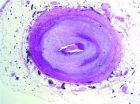(Press-News.org) UCLA researchers have pinpointed the culprit behind chronic rejection of heart, lung and kidney transplants. Published in the Nov. 23 edition of Science Signaling, their findings suggest new therapeutic approaches for preventing transplant rejection and sabotaging cancer growth.
The team focused on the mechanism behind narrowing of the donor's grafted blood vessels, which blocks blood from reaching the transplanted organ. Starved of oxygen and other nutrients, the organ eventually fails, forcing the patient back on the transplant waiting list.
"Chronic rejection is the No. 1 cause of organ failure in the first year of transplant," explained Elaine Reed, director of the UCLA Immunogenetics Center and professor of pathology at the David Geffen School of Medicine at UCLA. "In the first five years, some 40 percent of organs fail after transplant due to blockage of the grafted blood vessels. Currently, we have no way to treat this deadly condition."
Earlier research by Reed's laboratory discovered that patients whose immune systems manufactured antibodies to their donor's human leukocyte antigens (HLA) were at higher risk for chronic rejection.
In this study, Reed and her colleagues looked at how HLA molecules on donor tissue provoke an immune response in the patient. The team examined how the patient's antibodies trigger signals that spark overgrowth of the cells lining the inner blood vessels of the grafted organ.
The scientists discovered that HLA's ability to stimulate cell growth and movement depends upon a quid pro quo relationship with another molecule called integrin beta 4.
"Integrin enables cells to survive and spread, which is essential for tumor progression," said Reed. "We suspect that integrin hijacks HLA and takes over its functions. When we suppressed integrin, HLA was unable to make cells grow and move."
Conversely, when the team suppressed HLA, integrin could no longer support cells' communication with their environment. The finding implies that HLA is required for functions regulated by integrin, such as cellular movement.
"Ours is the first study to demonstrate a physical and functional liaison between HLA and integrin," said Reed. "HLA's role in helping integrin is a completely new function that has never been described before."
The UCLA findings offer valuable insight into the molecular mechanisms that allow HLA to stimulate cellular growth and movement.
"What I'm excited about from a medical point of view is how our findings offer new therapeutic opportunities," said Reed. "If we can identify ways to disrupt the relationship between HLA and integrin, we may be able to prevent chronic organ rejection in transplant patients."
The UCLA team's next step will be to investigate how integrin and HLA function together to promote cancer growth. The research suggests a new approach for halting cancer progression by preventing angiogenesis, the process by which a tumor develops its own blood supply.
"By interfering with integrin's reliance upon HLA to signal cells, we can sabotage cells' ability to sprout new blood vessels to feed the tumor," observed Reed.
INFORMATION:
Reed's UCLA coauthors included Xiaohai Zhang and Enrique Rozengurt.
The study was supported by grants from the National Institute of Allergy and Infectious Diseases, the National Heart Lung and Blood Institute and the National Institute of Diabetes, Digestive and Kidney Disease.
UCLA team uncovers mechanism behind organ transplant rejection
Suggests new therapies to prevent chronic rejection, stop cancer progression
2010-11-19
ELSE PRESS RELEASES FROM THIS DATE:
In fending off diseases, plants and animals are much the same, research shows
2010-11-19
It may have been 1 billion years since plants and animals branched apart on the evolutionary tree but down through the ages they have developed strikingly similar mechanisms for detecting microbial invasions and resisting diseases.
This revelation was arrived at over a period of 15 years by teams of researchers from seemingly disparate fields who have used classical genetic studies to unravel the mysteries of disease resistance in plants and animals, according to a historical overview that will appear in the Nov. 19 issue of the journal Science.
The report, written ...
Global economic woes make universal access to aids drugs unlikely, Stanford analysis shows
2010-11-19
STANFORD, Calif. — Universal access to lifesaving AIDS drugs — a United Nations' Millennium Development Goal that officials hoped to accomplish by 2010 — would require a staggering $15 billion annual investment from the international community at a time when the economic downturn is challenging continued funding for relief efforts, according to a new analysis by researchers at the Stanford University School of Medicine.
The study underscores the need for groups combating AIDS to rethink how they allocate scarce resources, as what was once the centerpiece of the movement ...
Care for prisoners will improve public health
2010-11-19
GALVESTON, Texas — In a comprehensive global survey, researchers in Texas and England have concluded that improving the mental and physical health of inmates will improve public health.
In their article, "The health of prisoners," Seena Fazel of the University of Oxford and Jacques Baillargeon of the University of Texas Medical Branch at Galveston, write that caring for the mental and physical health of prisoners has a direct and important impact on public health that should be recognized. Their findings, to be published Online First in the British medical journal The ...
Magnetic trapping will help unlock the secrets of anti-matter
2010-11-19
A clearer understanding of the Universe, its origins and maybe even its destiny is a significant step closer, thanks to new research.
As part of a major international experiment called ALPHA*, based at CERN in Switzerland, researchers have helped to achieve trapping and holding atoms of 'anti-hydrogen', which has not previously been possible.
The project involves physicists at Swansea University led by Professor Mike Charlton, Dr Niels Madsen and Dr Dirk Peter van der Werf and the University of Liverpool under Professor Paul Nolan, all supported by the Engineering ...
Gangster birds running protection racket give insight into coevolution
2010-11-19
Like gangsters running a protection racket, drongos in the Kalahari Desert act as lookouts for other birds in order to steal a cut of their food catch. The behaviour, revealed in research funded by the Biotechnology and Biological Sciences Research Council (BBSRC) published in Evolution and reported in Nature's Research Highlights today (18 November), may represent a rare example of two species evolving from a parasitic to a mutualistic relationship.
The team from the Universities of Bristol, Cambridge and Cape Town showed that victimised pied babblers gained a mitigating ...
Shockwaves work better than surgery for smaller kidney stones trapped in the ureter
2010-11-19
Different techniques should be used to remove single stones that have become lodged in the distal ureter after being expelled by the kidney, depending on whether they are under or above one centimetre, according to the December issue of BJUI.
Surgeons from the Department of Urology at University Federico II, Naples, Italy, believe that extracorporeal shockwave lithotripsy (ESWL) - which uses a non-invasive acoustic pulse to break down ureteric stones - should be the treatment of first choice in patients with a stone of up to 1cm. Patients with a stone over 1cm should ...
Video games lead innovation in the e-services economy
2010-11-19
The video games industry is leading the overall trend of transformation of digital products into e-services, according to the report "Born digital/ Grown digital – Assessing the future competitiveness of the EU video games software industry" published today by the European Commission's Joint Research Centre. Online games, for example, play a major role in the digital content convergence process based on digital distribution of different types of content and the diffusion of interactive capabilities for consumers. This phenomenon is having an effect on the movie, video, ...
University of Leicester space scientists involved in development of new breed of space vehicle
2010-11-19
Scientists and engineers at the internationally acclaimed Space Research Centre at the University of Leicester are developing a conceptual motor design for a Mars 'hopping' vehicle which should lead to a greater understanding of the 'Red Planet'.
Their research findings have been published this month by the Proceedings of the Royal Society A (http://rspa.royalsocietypublishing.org/content/early/2010/11/11/rspa.2010.0438.short?rss=1 )
Robots exploring Mars can carry scientific instruments that measure the physical and chemical characteristics of the Martian surface ...
Bioscience researchers defeating potato blight
2010-11-19
Researchers funded by the BBSRC Crop Science Initiative have made a discovery that could instigate a paradigm shift in breeding resistance to late blight – a devastating disease of potatoes and tomatoes costing the industry £5-6 billion a year worldwide. They will share this research with industry at an event in London later today (18 November).
Professor Paul Birch of the University of Dundee and his team at the Scottish Crop Research Institute (SCRI), the University of Dundee, and the University of Aberdeen have developed a new approach to breeding resistance to the ...
New disease-resistant food crops in prospect
2010-11-19
Researchers have uncovered the genetic basis of remarkable broad-spectrum resistance to a viral infection that, in some parts of the world, is the most important pathogen affecting leafy and arable brassica crops including broccoli, cauliflower, cabbage, kale, swede and oilseed rape. They have tested resistant plants against a range of different strains of the virus taken from all over the world and so far, no strain has been able to overcome the resistance.
The research on the so-called Turnip mosaic virus (TuMV), led by Dr John Walsh of the University of Warwick and ...
LAST 30 PRESS RELEASES:
University of Ottawa Heart Institute, the University of Ottawa and McGill University launch ARCHIMEDES to advance health research in Canada
The world’s largest brain research prize awarded for groundbreaking discoveries on how we sense touch and pain
Magnetofluids help to overcome challenges in left atrial appendage occlusion
Brain-clearing cells offer clues to slowing Alzheimer’s disease progression
mRNA therapy restores fertility in genetically infertile mice
Cloaked stem cells evade immune rejection in mice, pointing to a potential universal donor cell line
Growth in telemedicine has not improved mental health care access in rural areas, study finds
Pitt scientists engineer “living eye drop” to support corneal healing
Outcomes of older adults with advanced cancer who prefer quality of life vs prolonging survival
Lower music volume levels in fitness class and perceived exercise intensity
Of crocodiles, counting and conferences
AERA announces 2026 award winners in education research
Saving two lives with one fruit drop
Photonic chips advance real-time learning in spiking neural systems
Share of migratory wild animal species with declining populations despite UN treaty protections worsens from 44% to 49% in two years; 24% face extinction, up 2%
One in 20 babies experiences physical abuse, global review finds
Tundra tongue: The science behind a very cold mistake
Targeting a dangerous gut infection
Scientists successfully harvest chickpeas from “moon dirt”
Teen aggression a warning sign for faster aging later in life
Study confirms food fortification is highly cost-effective in fighting hidden hunger across 63 countries
Special issue elevates disease ecology in marine management
A kaleidoscope of cosmic collisions: the new catalogue of gravitational signals from LIGO, Virgo and KAGRA
New catalog more than doubles the number of gravitational-wave detections made by LIGO, Virgo, and KAGRA observatories
Antifibrotic drug shows promise for premature ovarian insufficiency
Altered copper metabolism is a crucial factor in inflammatory bone diseases
Real-time imaging of microplastics in the body improves understanding of health risks
Reconstructing the world’s ant diversity in 3D
UMD entomologist helps bring the world’s ant diversity to life in 3D imagery
ESA’s Mars orbiters watch solar superstorm hit the Red Planet
[Press-News.org] UCLA team uncovers mechanism behind organ transplant rejectionSuggests new therapies to prevent chronic rejection, stop cancer progression

